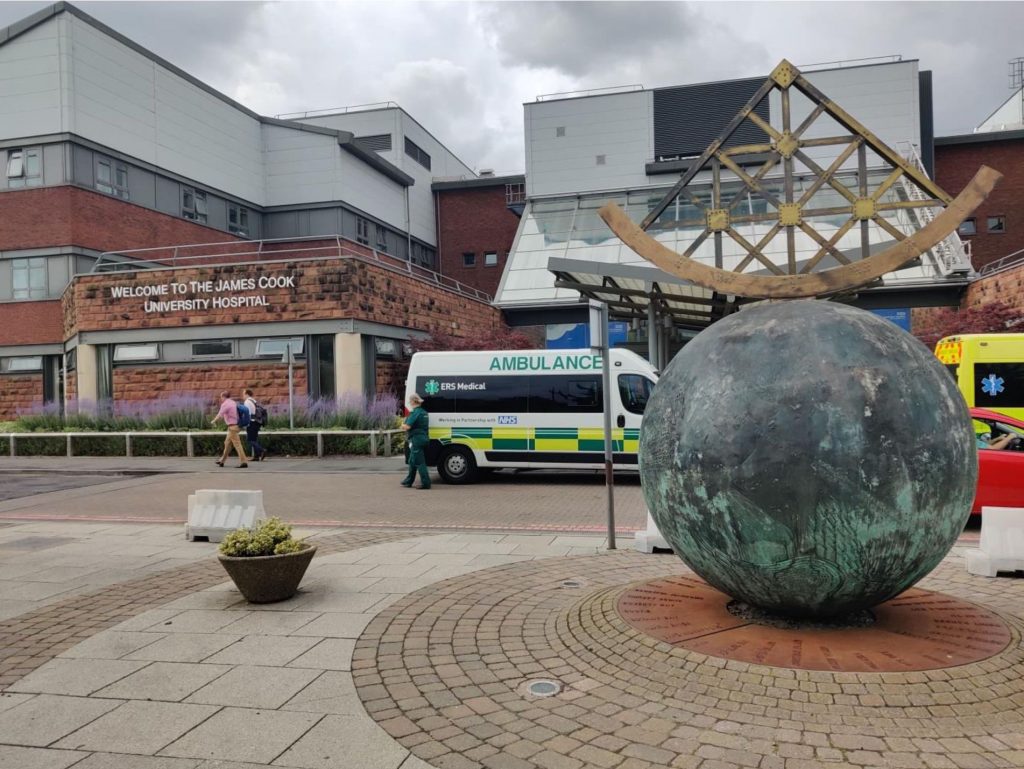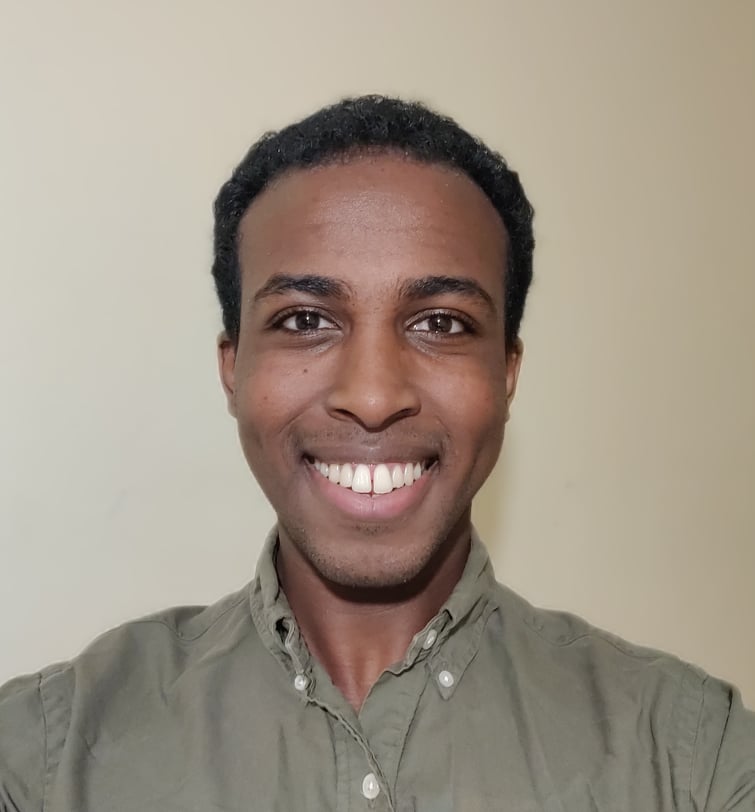My first day at the South Tees NHS Foundation Trust was on the 20th of July 2021 at the newly built post-graduate centre at James Cook University Hospital. The hospital is a tertiary centre serving up to 1.5 million people and an international hub for cardiothoracic surgery. James Cook is an international flagship site for TAVI (transcatheter aortic valve implantation), a minimally invasive heart valve replacement procedure that provides an alternative to open heart surgery for higher risk patients. They also insert up to 300 pacemakers a year with some of them being the size of a rice grain!

I was a little anxious about meeting my colleagues-to-be but also excited to make some friends. Little did I know that the South Tees region was also a centre for medics in the military to train in. They were all seated at the back of the lecture theatre dressed from head to toe in their fancy military outfits. We were all given a warm welcome to the trust and met a few key figures amongst the post-graduate department.
The second day of shadowing was based at Friarage Hospital in Northallerton where I was to be learning from the current FY1 (Foundation Year 1) doctors on the clinical decisions unit. This unit is responsible for assessing and triaging unwell patients and determining whether they need to be ‘sent up the road’ to James Cook for further management. I’m going to be honest with you; I was experiencing imposter syndrome when I first started working on the wards. It all felt a little overwhelming at first as I still had the mind-set of a medical student and was constantly second-guessing my decisions. The nurses would call me ‘Doctor Abdi’ and ask me to prescribe things such as blood products as though it was second-nature to me. As a newly qualified doctor with a fresh GMC (General Medical Council) registration, I was quadruple checking everything with the BNF (British National Formulary) and making sure my prescriptions were airtight. I have (had) the kind of personality where I’m a little obsessive about doing things thoroughly and by-the-book. You find out really quickly that one of the most important skills to master is task prioritisation. Do I want to spend an hour on each patient reviewing their complete medical history, drug charts and writing out an entire essay before the consultant arrives? Or do I quickly take note of the key bits of information and review their observations and pending investigation results? It took me two weeks of finishing well beyond the end of my shift to realise that something drastically needed to change or else I wasn’t going to have much of a personal life.

I had never verified a death during medical school (including my assistantship). As you are the most junior doctor on the ward, you are likely to spend the most time communicating with patients and tending to any queries or concerns they may have. Over the short amount of time that I was shadowing, I found that I was developing strong emotional connections with my patients. We were taught in medical school to continue to speak to the patient as though they were alive in order to show the deceased patient and their relatives some respect. I can vividly recall my first ever death verification. I was asked to see a young woman with advanced metastatic breast cancer with whom I had developed a strong emotional bond, in the early hours of the morning. Looking at her, lying unresponsive in this dark side room with lifeless dilated pupils was an image that has been scored permanently into my mind. A complete antithesis to how she was with me over the few days where she was smiling despite all the pain and distraught from her advanced metastatic breast cancer. I couldn’t help it, but I was on the verge of crying, a response I never saw coming. This experience reminded me of the great responsibility that comes with being a physician. A responsibility I will never take for granted again.
This experience reminded me of the great responsibility that comes with being a physician.
I had the opportunity to clerk a few patients and perform clinical assessments on patients who were acutely unwell. I found that I tended to perform long thorough textbook assessments, as I was constantly finding myself worried that I would miss something important. I feel as though making mistakes is an inevitable part of becoming an effective FY1 as you tend to develop your own unique systematic approach based on previous experiences over time. A key strategy that helped me see rapid improvements in my clinical judgement was trying to adopt the mentality of a senior registrar or consultant when managing patients and try to draft your own complete management plan (that focuses not only on the medical but the social and psychological needs of the patient). You can then run your plan past a senior member of the team and identify what you missed out or what could be added. It seems scary but I promise you, once you meet your team and create friendly relationships with your seniors, you will have a nice little cushion to fall back on if you feel stuck.
I spent the penultimate day of my first week on Ainderby ward, our hospital’s temporary Covid ward. Going from being a medical student where we were denied seeing patients with Covid and suddenly being in Level 3 PPE (Personal Protective Equipment) and assessing these patients was a big change. I definitely felt a little unprepared as my own clinical experience with these patients was virtually non-existent. You very quickly find out that it is actually quite difficult to assess patients as you can’t feel things as well through all the protective gear and non-verbal communication becomes very difficult. The job requires excellent communication and teamworking skills. I found that I had to communicate with other departments a lot more than I expected. You’ll feel like a glorified secretary half the time and then you’ll spend the other half feeling like a doctor. There is a large amount of secretarial work to be done during the week including discharge letters, calling to book appointments, and organising referrals to outpatient clinics. It’s the bane of every FY1’s life but if you manage to create an efficient system in your group whereby one of you can focus on getting the discharge letters done in the afternoon it can really help with the workload. The one thing you don’t want is to stay back extra 30 to 45 minutes rushing to complete your jobs so that you can go home.
You’ll feel like a glorified secretary half the time and then you’ll spend the other half feeling like a doctor.
In the final week of shadowing, I spent my time on Romanby ward, a unit which specialises in complex long stays including patients with a large number of co-morbidities coming from a diverse range of specialties. Some of the cases I had seen included stage four glioblastoma multiforme, non-Hodgkin’s lymphoma, plasmacytoma, myelodysplasia, metastatic hepatocellular carcinoma, listeria cerebritis (a really interesting case) and many more advanced malignancies. Most of these patients were ‘not for full escalation’ and were put on an end-of-life pathway. I had the opportunity to prescribe palliative medications, break bad news and give updates to relatives more frequently than anticipated but these delicate conversations prepared me well before my official start date.
In retrospect, I would say that the extra week of shadowing was completely invaluable in helping me prepare for my role as an FY1. Those additional few days of familiarising myself with the trust’s electronic systems and internal guidelines gave me the extra boost of confidence I needed to not feel like an imposter.
~~~~~~~~~~~~~~~~~~~

Dr Mohamed Abdi is a FY1 at the South Tees NHS Foundation Trust. He is currently doing a rotation in medicine and will be moving on to General Surgery and Paediatrics. His interests include ACCS and Plastic surgery.

